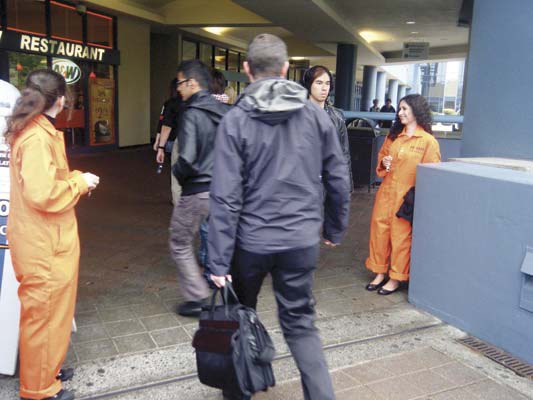About forty staff members of Express Pardons took transit on June 29, sitting on SkyTrain seats, reading newspapers, all regular transit-riding activities.
The difference was in their attire - all were wearing bright orange jumpsuits, part of an awareness campaign to educate the public about the amount of people with criminal records in Canada.
The point was to provide a visual example of how many Canadians, about one in seven, have records, said Ainsley Muller, director of business management for the company, and a Burnaby resident.
"There were a lot of reactions of 'What?' and 'Are you serious?'" Muller said, when other riders were told the amount.
The point was not to alarm the public, he said, but to inform them of how many people they know may be dealing with the consequences of a criminal record.
"We were a little concerned about doing it after the (Vancouver Game 7) riot," he said, but added the response was great.
The staff members rode the SkyTrain from King George to Waterfront, making stops at major hubs such as Metrotown station in Burnaby to hand out pamphlets with information, he said.
It ran from 7 to 11 a.m., Muller said, adding if they do a repeat there will likely be an evening run as well.
"It certainly hasn't come to an end," he said of the campaign, which he hopes to take across Canada.
The majority of those with records are for minor crimes, Muller told the NOW in June, prior to the day of action.
A criminal record never goes away by itself, Muller said, and limits a person's ability to work or travel.
The company decided to organize the campaign to bring attention to proposed federal legislation that would make obtaining a pardon more difficult.
Since the Criminal Records Act was enacted in the 1970's, 96 per cent of the 400,000 Canadians who have received pardons have not re-offended, according to the Canadian Criminal Justice Association.
Between 10 and 15 per cent of Canadians have criminal records, the association added in a brief to the House of Common's standing committee on justice and human rights, but only about 11 per cent of those ever apply for a pardon.
The brief was in response to Bill-C23, an act to amend the Criminal Records Act, which proposed a number of changes.
Bill C23 was divided into two bills - Bill C23a, which passed last June, and Bill C23b.
Bill-C23b, put forward by Minister of Public Safety Vic Toews, was intended to eliminate pardons for serious crimes.
Bill C23b included changes such as replacing the term pardon with the term record suspension, a move Muller approves of as being a more accurate description of the pardon process.
Other proposed changes were granting absolute discretion to the National Parole Board on refusing to grant or revoke record suspensions, restricting who can receive a pardon, and introducing a three-strike provision, as in the United States. Waiting periods would also be extended.
Muller expects the same measures will likely be included in the crime omnibus bill that Prime Minister Stephen Harper mentioned in his election campaign. Harper committed to combining a number of crime bills to be put before Parliament within 100 days of his return to office during his campaign.
The Ministry of Public Safety did not respond to requests for an update on the status of the crime bill.
To see a YouTube video of the day of action, click here: http://www.youtube.com/watch?v=ooQpVlnWfSg.



